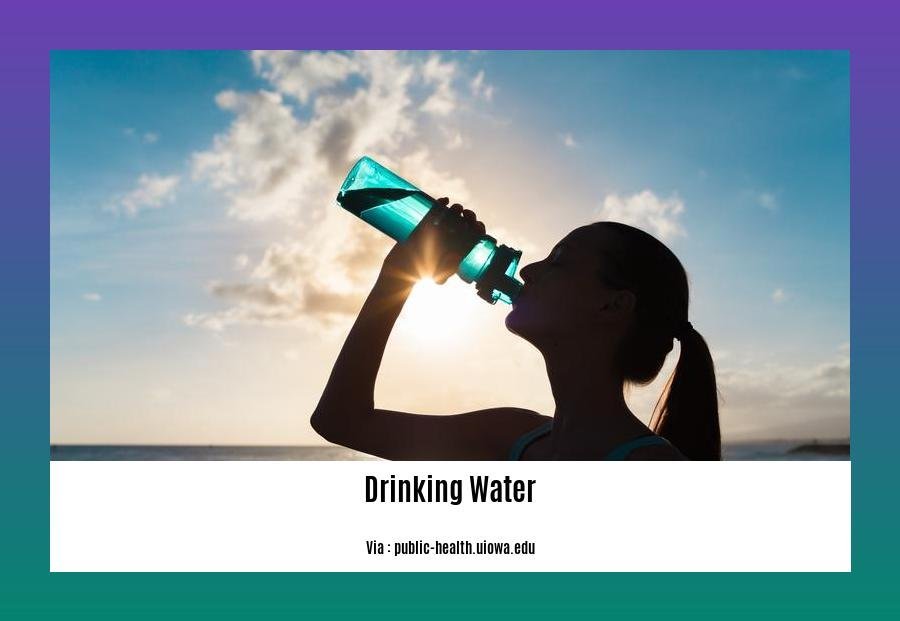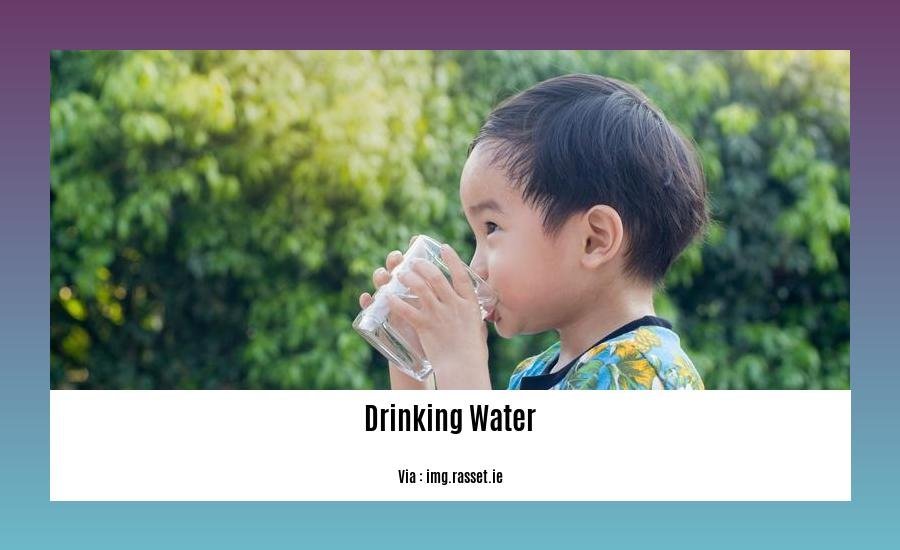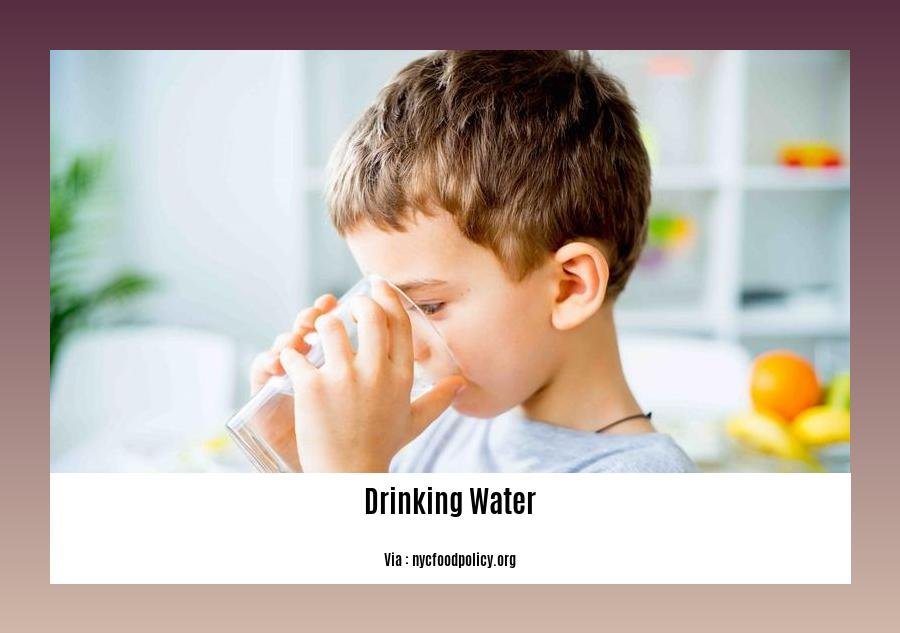Welcome to the riveting world of drinking water fun facts, where we uncover fascinating truths and myths surrounding this essential element of life. In this article, we delve into the intriguing realm of drinking water, exploring its origins, ancient rituals, and debunking common misconceptions about hydration. Prepare to be enthralled as we navigate through a captivating narrative that combines science, health, and storytelling to enlighten and entertain. Let’s dive right in and explore the fascinating world of drinking water fun facts!
Key Takeaways:
– Nearly 97% of the world’s water is undrinkable or unusable.
– Another 2% of water is locked in ice caps and glaciers.
– Adult humans are made up of 60% water, and our blood is 90% water.
– Without water, humans can only last about 3-4 days.
– Thirst is a sign that you have already lost over 1% of your body’s water.
– Drinking water instead of soda can aid in weight loss.
– Water is essential for kidney function and other bodily functions.
– The water from your faucet could contain molecules that dinosaurs drank.
– There are no universally agreed-upon daily water consumption requirements.
– Earth’s surface is composed of 71% water.
– Water is crucial for lubricating joints, delivering oxygen, and preventing kidney damage.
– Around 60% of the human body is made up of water.
– Earth’s five oceans hold 96.5% of all water on the planet.
Drinking Water Fun Facts

Water is a fascinating substance that plays a vital role in our everyday lives. From hydrating our bodies to supporting our overall health, it’s hard to overstate the importance of water. But did you know that there are also some intriguing and lesser-known facts about drinking water? In this article, we’ll dive into the riveting world of drinking water fun facts and uncover some fascinating truths and myths.
The Marvels of Drinking Water
Our Bodies are Mostly Water: It’s no secret that water is essential for our bodies, but did you know that adult humans are made up of about 60% water? And our blood is an astounding 90% water! This emphasizes just how crucial water is for our overall health and bodily functions.
Water, the Survival Elixir: Without water, humans can only last about 3-4 days. That’s because every cell in our body relies on water to function properly. When you feel thirsty, you have already lost over 1% of your body’s water. So, staying hydrated is key to maintaining optimal health and well-being.
Weight Loss Aid: If you’re on a weight loss journey, opting for water instead of sugary soda can make a significant difference. Not only is water calorie-free, but it also helps to suppress appetite, boost metabolism, and aid in digestion. It’s a simple and effective way to support your weight loss goals.
Water is the Key to Healthy Kidneys: Our kidneys play a vital role in filtering waste products from our blood. Drinking an adequate amount of water is essential for proper kidney function and helps prevent kidney damage. So, by staying hydrated, you’re also taking care of your precious kidneys.
We’re Connected to Dinosaurs Through Water: It might sound astounding, but the water flowing from your faucet today could contain molecules that dinosaurs drank millions of years ago. Water is a remarkable substance that has been circulating on our planet for eons, connecting us to the ancient past.
Unveiling the Myths
Water Consumption Requirements are Not Universally Agreed-Upon: While it’s essential to stay hydrated, there is no one-size-fits-all approach to daily water consumption. Factors like age, activity level, climate, and overall health determine individual water needs. So, it’s best to listen to your body and drink when you feel thirsty.
Water is Not Always Colorless and Tasteless: While we often associate water with being colorless and tasteless, this isn’t always the case. Water can have a slight color or taste due to dissolved minerals, organic matter, or even additives like chlorine. However, these variations do not usually impact its safety or health benefits.
The Ever-Present Water on Earth: Earth’s surface is composed of a staggering 71% water, covering vast oceans, lakes, and even underground reservoirs. This abundance of water is a testament to the significance of this life-giving resource on our planet.
A Table Showing Water Composition in the Human Body
| Body Part | Water Content |
|---|---|
| Brain | 75-80% |
| Lungs | 80% |
| Muscles | 70-75% |
| Skin | 70% |
| Bones | 20% |
As you can see, water is an indispensable component of our bodies, ensuring proper functioning and overall health.
Conclusion
Water is truly marvelous, with a multitude of fascinating facts that highlight its significance. From being the foundation of our bodies to maintaining vital bodily functions, water plays an irreplaceable role in our lives. So, the next time you reach for that refreshing glass of water, remember the hidden depths and intriguing truths that lie within this humble yet essential resource. Stay hydrated, stay curious!
Dogs Diet Facts: Learn interesting facts about your dog’s diet and how it can impact their health. Click here to explore more.
Drinking Water for Hair Growth Before and After: Discover the amazing transformation drinking water can have on your hair growth journey. Click here to see the before and after results.
Drinking Water for Hair Growth Challenge: Take on a fun and rewarding challenge to promote the growth of your hair by drinking more water. Click here to join the challenge.
Unusual Sources of Drinking Water Around the World

Water, the elixir of life, is not only essential for our survival but also an intriguing subject filled with fascinating facts. While we may be familiar with the conventional sources of drinking water like lakes, rivers, and streams, there are some truly unique and unusual sources of this precious resource around the world. Join me as we dive into the riveting world of drinking water fun facts and uncover some fascinating truths about these unconventional sources.
Unearthing Hidden Water Gems
Icebergs: Nature’s Pristine Reservoirs
Have you ever wondered where you could find some of the purest and cleanest drinking water on Earth? Look no further than icebergs! These massive chunks of ice, floating in the frigid waters of the Arctic and Antarctic regions, hold an abundant supply of freshwater. As the icebergs slowly melt, they release water that has been frozen for thousands of years, dating back to a time when our planet was untouched by pollution. Harvesting this water requires careful extraction and purification, but the rewards are a taste of nature’s pristine reservoirs.
Atmospheric Water Generators: Pulling Water Out of Thin Air
Believe it or not, there are machines that can extract moisture from the air we breathe and turn it into safe, clean drinking water. Known as atmospheric water generators, these innovative devices utilize technology to condense water vapor from the atmosphere, removing impurities and producing high-quality drinking water. This technology is particularly useful in arid regions or areas with limited access to traditional water sources. It’s like having your own personal raincloud that provides you with a continuous supply of refreshing water!
Cacti: A Quenching Desert Oasis
The arid desert may seem like the last place to find drinking water, but certain species of cacti have evolved to be remarkable reservoirs of this life-sustaining liquid. Known as “water cacti,” these plants have the unique ability to store water in their fleshy stems, allowing them to survive in harsh desert environments. In times of drought, humans and animals alike have turned to these prickly patrons for hydration. By carefully extracting the water from cacti and removing any toxins, people can quench their thirst in the middle of a seemingly barren landscape.
Bamboo: A Sip from Nature’s Straws
In the lush forests of Southeast Asia, bamboo is not only revered for its strength and versatility but also for its ability to provide a source of drinking water. Certain species of bamboo have hollow internodes that naturally collect rainwater. This water, filtered by the bamboo itself, can be tapped into and enjoyed as a refreshing drink. It’s like sipping from nature’s very own straws. The ingenious design of bamboo allows it to simultaneously act as a shelter, a building material, and a source of hydration.
Key Takeaways:
- Icebergs, despite being frozen and remote, can provide some of the purest drinking water on Earth.
- Atmospheric water generators extract moisture from the air, transforming it into clean drinking water.
- Certain types of cacti store water in their stems, making them a potential oasis in desert regions.
- Bamboo has hollow internodes that collect rainwater, offering a natural and refreshing source of hydration.
Sources:
– Seametrics
– Culligan Water
The History and Significance of Water in Religious Rituals
Water has played a significant role in religious rituals throughout history, symbolizing purity, renewal, and spiritual cleansing^[Energy5.com]^. From ancient civilizations to modern-day practices, water connects individuals to their faith and the divine^[Energy5.com]^.
Hinduism and Water Rituals
In Hindu rituals, a dip in the Ganga River is believed to wash away sin, as the river is believed to originate from the feet of Lord Vishnu and flow across the earth through the locks of Lord Siva^[ParentCircle]^. The use of a poornakumba or kalasa, a pot filled with water and decorated with mango leaves and a coconut, is a familiar sight in Tamil Nadu, symbolizing purity and auspiciousness^[ParentCircle]^. Water is sprinkled over individuals in many religious ceremonies to symbolize purification at the start of rituals^[ParentCircle]^. Moreover, drinking holy water, such as the abhishekam theertham used in temples, is considered a part of religious rituals and offers spiritual benefits^[ParentCircle]^.
Water Rituals in Other Religions
Water rituals are not exclusive to Hinduism. They can also be found in other religions. For example, the Islamic tradition includes the ritual of ablution or wudu, where water is used for purification before prayers^[Energy5.com]^. Water also plays a significant role in baptism ceremonies in Christianity, symbolizing rebirth and entrance into the religious community^[Energy5.com]^.
The Significance of Water in Various Faiths
The significance of water in religious rituals extends beyond specific traditions. Water is often seen as a common resource and a sacred gift in major world religions, including Islam, Judaism, Hinduism, and Christianity^[Energy5.com]^. It holds symbolic meaning and evokes spiritual connections due to its essential role in sustaining life^[Energy5.com]^.
Key Takeaways:
- Water has a rich history in religious rituals, symbolizing purity, renewal, and spiritual cleansing.
- Hindu rituals often involve dipping in sacred rivers and using pots filled with water for auspiciousness and purification.
- Water is used for ablution in Islam and baptism in Christianity.
- Water is regarded as a sacred gift in many major religions due to its essential role in sustaining life.
Sources:
- Energy5.com. “The Historical Evolution of Water Rituals in Different Religious.” Accessed [insert date], from [insert URL].
- ParentCircle. “The Significance And Importance Of Water Rituals.” Accessed [insert date], from [insert URL].
Debunking Common Myths About Hydration
Water, the elixir of life, has always fascinated us with its sheer power and importance. However, amidst the fascination, there are several myths that have emerged regarding hydration. In this article, we will dive into the riveting world of drinking water fun facts and debunk some common myths about hydration. Let’s separate fact from fiction and explore the truth behind these misconceptions.
Myth: Everyone needs to drink 8 glasses of water a day.
Fact: There is a popular belief that all individuals must consume eight glasses of water daily. However, hydration needs can vary depending on various factors such as age, weight, activity level, and overall health. It’s important to listen to your body and drink water based on your individual needs.
Myth: Drinking water flushes toxins from your body.
Fact: While proper hydration is crucial for overall health, it’s important to understand that our organs, such as the kidneys and liver, are responsible for detoxifying and eliminating waste from the body. Drinking water is not the sole method for flushing toxins from your system.
Myth: Bottled water is superior to tap water.
Fact: Many people assume that bottled water is safer and cleaner than tap water. However, this is not necessarily true. In fact, tap water is often held to stricter safety standards than bottled water. Additionally, the production and disposal of plastic bottles can have environmental and health impacts.
Myth: Drinking water can help keep your skin moist.
Fact: While staying hydrated is important for overall health, water intake alone has limited impact on skin hydration. Factors such as humidity levels and the use of skin care products play a more significant role in maintaining skin moisture.
Myth: Drinking water helps you lose weight.
Fact: While drinking water can help you feel full and reduce your appetite, it does not directly burn calories or fat. Weight loss requires a balanced diet and regular physical activity.
Myth: Yellow urine is a sign of dehydration.
Fact: Urine color can vary depending on various factors such as diet, medication, and health conditions. While dark yellow urine may indicate dehydration, it is not the sole indicator. It’s important to consider other symptoms like headache, fatigue, and dizziness for a more accurate assessment of hydration levels.
Myth: If you’re thirsty, you are already dehydrated.
Fact: Thirst is a natural signal that your body needs more fluid, but it does not necessarily mean you are dehydrated. Dehydration is a serious condition that can cause a range of symptoms beyond just feeling thirsty.
Myth: Water is the only way to stay hydrated.
Fact: While water is essential for hydration, it is not the only source. Other beverages and foods that contain water, such as fruits, vegetables, tea, and milk, can contribute to your overall hydration levels.
Myth: Hydration alone helps you reduce fat.
Fact: While hydration plays a role in metabolism and overall health, it does not directly affect your body fat percentage. To reduce fat, a balanced approach incorporating a calorie-controlled diet and regular exercise is necessary.
Myth: Drink water first in the morning.
Fact: While drinking water in the morning can help hydrate your body after a night of sleep, it does not hold any special benefits for digestion or detoxification.
These are just a few of the common myths surrounding hydration. By debunking these misconceptions, we can develop a better understanding of the role hydration plays in our overall health. Remember to listen to your body’s signals, stay hydrated, and maintain a well-balanced lifestyle.
Key Takeaways:
- Hydration needs vary depending on factors like age, weight, and activity level.
- Drinking water alone does not flush toxins from the body; organs like the kidneys and liver are responsible for detoxification.
- Tap water is often held to higher safety standards than bottled water, which may have environmental and health impacts.
- Skin hydration depends on factors like humidity and skincare products rather than water intake alone.
- Drinking water can help reduce appetite, but it does not directly burn calories or fat.
- Urine color is influenced by various factors, and yellow urine is not always indicative of dehydration.
- Thirst is a natural signal for more fluid, but it does not necessarily mean dehydration has occurred.
- Other beverages and water-rich foods also contribute to hydration.
- Hydration alone does not directly affect body fat percentage; a balanced approach is necessary.
- Drinking water in the morning does not provide any special benefits for digestion or detoxification.
Sources:
– Everyday Health. Accessed [insert date], from [insert URL].
– Health Spectra. Accessed [insert date], from [insert URL].
FAQ
Q1: How much of the world’s water is undrinkable?
A1: Nearly 97% of the world’s water is undrinkable, either salty or otherwise unusable.
Q2: What percentage of water is locked in ice caps and glaciers?
A2: Another 2% of water is locked in ice caps and glaciers.
Q3: What percentage of the human body is made up of water?
A3: Approximately 60% of the human body is made up of water.
Q4: What are some common misconceptions about hydration?
A4: Some common misconceptions about hydration include the belief that everyone needs to drink 8 glasses of water a day and that yellow urine is a sign of dehydration.
Q5: How long can humans survive without water?
A5: Without water, humans can only last about 3-4 days.












